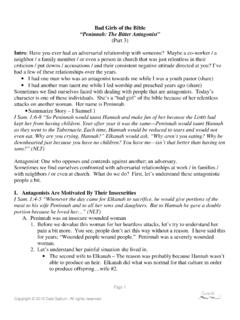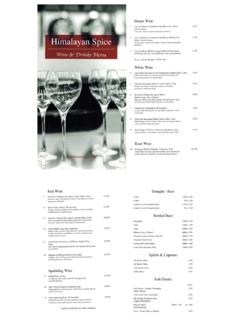Transcription of Art After Philosophy (1969) - Sabine Bitter
1 Art After Philosophy (1969). Joseph Kosuth The fact that it has recently become fashionable for physicists themselves to be sympathetic toward religion .. marks the physicists' own lack of confidence in the validity of their hypotheses, which is a reaction on their part from the antireligious dogmatism of nineteenth-century scientists, and a natural outcome of the crisis through which physics has just passed. A. J. Ayer.. once one has understood the Tractatus there will be no temptation to concern oneself anymore with Philosophy , which is neither empirical like science nor tautological like mathematics.
2 One will, like Wittgenstein in 1918, abandon Philosophy , which, as traditionally understood, is rooted in confusion. J. O. Urmson. Traditional Philosophy , almost by definition, has concerned itself with the unsaid. The nearly exclusive focus on the said by twentieth-century analytical linguistic philosophers is the shared contention that the unsaid is unsaid because it is unsayable. Hegelian Philosophy made sense in the nineteenth century and must have been soothing to a century that was barely getting over Hume, the Enlightenment, and Hegel's Philosophy was also capable of giving cover for a defense of religious beliefs, supplying an alternative to Newtonian mechanics, and fitting in with the growth of history as a discipline, as well as accepting Darwinian He appeared to give an acceptable resolution to the conflict between theology and science, as well.
3 The result of Hegel's influence has been that a great majority of contemporary philosophers are really little more than historians of Philosophy , Librarians of the Truth, so to speak. One begins to get the impression that there is nothing more to be said. And certainly if one realizes the implications of Wittgenstein's thinking, and the thinking influenced by him and After him, Continental Philosophy need not seriously be considered Is there a reason for the unreality of Philosophy in our time? Perhaps this can be answered by looking into the difference between our time and the centuries preceding us.
4 In the past man's conclusions about the world were based on the information he had about it if not specifically like the empiricists, then generally like the rationalists. Often in fact, the closeness between science and Philosophy was so great that scientists and philosophers were one and the same person. In fact, from the times of Thales, Epicurus, Heraclitus, and Aristotle to Descartes and Leibnitz, the great names in Philosophy were often great names in science as well. 4. That the world as perceived by twentieth-century science is a vastly different one than the one of its preceding century, need not be proved here.
5 Is it possible, then, that in effect man has learned so much, and his intelligence is such, that he cannot believe the reasoning of traditional Philosophy ? That perhaps he knows too much about the world to make those kinds of conclusions? As Sir James Jeans has stated: .. When Philosophy has availed itself of the results of science, it has not been by borrowing the abstract mathematical description of the pattern of events, but by borrowing the then current pictorial description of this pattern; thus it has not appropriated certain knowledge but conjectures.
6 These conjectures were often good enough for the man-sized world, but not, as we now know, for those ultimate processes of nature which control the happenings of the man-sized world, and bring us nearest to the true nature of He continues: One consequence of this is that the standard philosophical discussions of many problems, such as those of causality and free will orof materialism or mentalism, are based on an interpretation of the pattern of events which is no longer tenable. The scientific basis of these older discussions has been washed away, and with their disappearance have gone all the arguments.
7 6. The twentieth century brought in a time that could be called the end of Philosophy and the beginning of art. I do not mean that, of course, strictly speaking, but rather as the tendency of the situation. Certainly linguistic Philosophy can be considered the heir to empiricism, but it's a Philosophy in one And there is certainly an art condition to art preceding Duchamp, but its other functions or reasons-to-be are so pronounced that its ability to function clearly as art limits its art condition so drastically that it's only minimally In no mechanistic sense is there a connection between Philosophy 's ending and art's beginning, but I don't find this occurrence entirely coincidental.
8 Though the same reasons may be responsible for both occurrences, the connection is made by me. I bring this all up to analyze art's function and subsequently its viability. And I do so to enable others to understand the reasoning of my and, by extension, other artists' art, as well to provide a clearer understanding of the term Conceptual art. 9. THE FUNCTION OF ART. The main qualifications to the lesser position of painting is that advances in art are certainly not always formal ones. Donald Judd (1963).
9 Half or more of the best new work in the last few years has been neither painting nor sculpture.. Donald Judd (1965). Everything sculpture has, my work doesn't. Donald Judd (1967). The idea becomes a machine that makes the art. Sol LeWitt (1965). The one thing to say about art is that it is one thing. Art is art-as-art and everything else is everything else. Art as art is nothing but art. Art is not what is not art. Ad Reinhardt (1963). The meaning is the use. Wittgenstein. A more functional approach to the study of concepts has tended to replace the method of introspection.
10 Instead of attempting to grasp or describe concepts bare, so to speak, the psychologist investigates the way in which they function as ingredients in beliefs and in judgments. Irving M. Copi. Meaning is always a presupposition of function. T. Segerstedt.. the subject matter of conceptual investigations is the meaning of certain words and expressions . and not the things and states of affairs themselves about which we talk, when using those words and expressions. G. H. Von Wright. Thinking is radically metaphoric.





